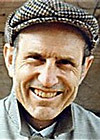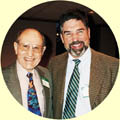So Ralph Luce, a pediatrician who could carry a tune, sang silly songs. He yodeled. He put on hand puppets to convince them it would be OK. Anything for a giggle.
And then, after hours and sometimes late into the night, he waited with parents, answering their questions, supervising children's progress and making sure the family left the office or hospital in a better state than it entered.
Dr. Luce, a respected pediatrician at Group Health and medical professor from Issaquah, died of complications from heart disease and a stroke at Providence Marianwood Nursing Home on March 14 at the age of 87.
One claim to fame might have been the Luce family name, since Dr. Luce was apparently a distant relative of Henry Luce, co-founder of Time magazine. But he shied away from that connection and made his mark through medicine, relatives and friends said.
He was born in California and lived on ranches in Idaho in his youth, selling milk every morning before school. He joined the Army and served in World War II. When he came back, he became a doctor and a professor at University of Washington's Medical School.
A devoted husband, a wonderful father to two daughters, a distinguished gentleman who liked to mix and match clothing patterns (with varying degrees of success, truth be told), an intellectual and world traveler who picked up languages like wildflowers -- these are some snapshots that emerge, according to those who knew and loved him.
"He was just one of my life's heroes," said Lynn McGlocklin, a nurse practitioner who studied with Dr. Luce and then worked with him for decades.
McGlocklin said Dr. Luce's dedication to his Group Health patients was almost a political statement, since he refused to make compromises or cut corners even as industry pressures increasingly required doctors to place profits first. Even joining the health-care cooperative in its formative years during the 1950s was seen as a controversial thing to do, she said.
"Dr. Luce took a professional risk," she said. "He had an impeccable reputation, and then he signed on with this little, teeny co-op out in Seattle. It was considered pretty socialist, pretty left-wing."
She added that he was equally devoted, and disarming, as a teacher.
"He was not at all imperious. He wasn't didactic at all," she said.
This approach served him well at the pingpong table, where he would lure residents half his age and then mercilessly beat them.
Louise Wenberg Luce, a widowed junior-high librarian, met Dr. Luce, who was divorced, on a Audubon hike on Mount Rainier in July 1978. It was a daylong walk where people were pausing to snap pictures of local flora, and they exchanged a few words when the group took a break.
"I just happened to sit on a rock next to where he was sitting for lunch, and I shared my mother's lemon bars with him," she said.
They were married in 1979.
Mrs. Luce, who met him at the twilight of his career, missed the 3 a.m. phone calls and the training sessions with residents. Instead, she saw a man who had time to read and write about public-health issues, who supported her dream to grow fruit trees, and who wanted to see the world with her.
They traveled the country from Oregon to North Carolina, staying in elder hostels. Already fluent in Spanish, when he traveled to Sweden he learned from tapes, becoming an instant hit with her relatives, she recalled.
His body was given to the UW Department of Biological Structure, Willed Body Program, for medical research and education.
So Ralph Luce, a pediatrician who could carry a tune, sang silly songs. He yodeled. He put on hand puppets to convince them it would be OK. Anything for a giggle.
And then, after hours and sometimes late into the night, he waited with parents, answering their questions, supervising children's progress and making sure the family left the office or hospital in a better state than it entered.
Dr. Luce, a respected pediatrician at Group Health and medical professor from Issaquah, died of complications from heart disease and a stroke at Providence Marianwood Nursing Home on March 14 at the age of 87.
One claim to fame might have been the Luce family name, since Dr. Luce was apparently a distant relative of Henry Luce, co-founder of Time magazine. But he shied away from that connection and made his mark through medicine, relatives and friends said.
He was born in California and lived on ranches in Idaho in his youth, selling milk every morning before school. He joined the Army and served in World War II. When he came back, he became a doctor and a professor at University of Washington's Medical School.
A devoted husband, a wonderful father to two daughters, a distinguished gentleman who liked to mix and match clothing patterns (with varying degrees of success, truth be told), an intellectual and world traveler who picked up languages like wildflowers -- these are some snapshots that emerge, according to those who knew and loved him.
"He was just one of my life's heroes," said Lynn McGlocklin, a nurse practitioner who studied with Dr. Luce and then worked with him for decades.
McGlocklin said Dr. Luce's dedication to his Group Health patients was almost a political statement, since he refused to make compromises or cut corners even as industry pressures increasingly required doctors to place profits first. Even joining the health-care cooperative in its formative years during the 1950s was seen as a controversial thing to do, she said.
"Dr. Luce took a professional risk," she said. "He had an impeccable reputation, and then he signed on with this little, teeny co-op out in Seattle. It was considered pretty socialist, pretty left-wing."
She added that he was equally devoted, and disarming, as a teacher.
"He was not at all imperious. He wasn't didactic at all," she said.
This approach served him well at the pingpong table, where he would lure residents half his age and then mercilessly beat them.
Louise Wenberg Luce, a widowed junior-high librarian, met Dr. Luce, who was divorced, on a Audubon hike on Mount Rainier in July 1978. It was a daylong walk where people were pausing to snap pictures of local flora, and they exchanged a few words when the group took a break.
"I just happened to sit on a rock next to where he was sitting for lunch, and I shared my mother's lemon bars with him," she said.
They were married in 1979.
Mrs. Luce, who met him at the twilight of his career, missed the 3 a.m. phone calls and the training sessions with residents. Instead, she saw a man who had time to read and write about public-health issues, who supported her dream to grow fruit trees, and who wanted to see the world with her.
They traveled the country from Oregon to North Carolina, staying in elder hostels. Already fluent in Spanish, when he traveled to Sweden he learned from tapes, becoming an instant hit with her relatives, she recalled.
His body was given to the UW Department of Biological Structure, Willed Body Program, for medical research and education.
Family Members
Sponsored by Ancestry
Advertisement
Advertisement






